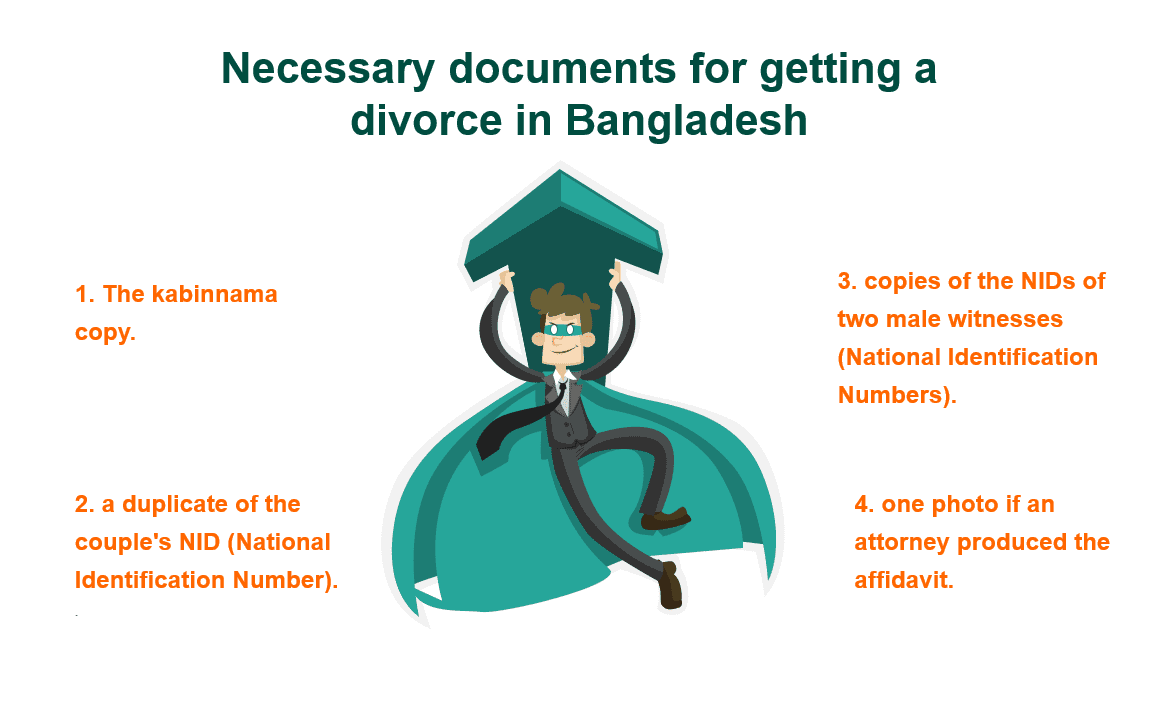Divorce Law and Procedure in Bangladesh – Legal process of getting a divorce.

Barrister Rahman
When compared to other countries, Bangladesh’s divorce laws are very simple and affordable. The majority of people in Bangladesh are Muslims, and they consider divorce to be one of the most heinous judicial actions. But occasionally a divorce is unavoidable for the betterment of the marriage. In the recent years, divorce cases has increased in Bangladesh. Proper information in this regard is needed to get a divorce. This article will cover all the laws and procedures regarding divorce in Bangladesh.

Divorce procedure in Bangladesh can be of two types:
a) Divorce with Notice: Unilateral divorce is another term for notice divorce. The approval of the divorce notice recipient is not required to issue a Divorce or Talaq by notice. In this case, one of the parties may object to the divorce.
b) Mutual Divorce: When both parties agree to divorce, it is called a mutual divorce. It is not necessary to provide notice because both parties are aware of the divorce.
The Legal Procedure for Divorce in Bangladesh:
- The divorce-granting party, which is usually the husband or wife, is required to serve a notice of divorce to the other spouse as well as the involved city corporation or chairman.
- The notices and marriage registrar’s book must bear the signature and fingerprint of the person granting the divorce.
- The marriage registrar’s notices book shall be signed by two male witnesses.
- Registered mail will be used to deliver the alerts.
- The office of the concerned city corporation will send the husband and wife three notices consecutively within three months of receiving the notice.
- The municipality will set up an arbitration council to resolve the couple’s disagreement.
- The city corporation will issue an order sheet if no party shows up nor the disagreement cannot be resolved.
- A certificate of divorce will then be issued by the marriage registrar.
Noncompliance with Divorce Procedure Penalty: A violation of the aforementioned divorce procedure carries a penalty of either simple imprisonment for a term up to one year or a fine up to ten thousand taka, or both.
Mutual Divorce Procedure:
Both the husband and wife must consent to the divorce in order for it to be finalized. The marriage license is signed by the husband, the wife, and two witnesses. Typically, both spouses sign a contract describing their terms and conditions before opting to divorce. The parties mostly decide on the dowry and the bride’s and child’s maintenance (If any). Notice is not required because everyone is aware of each other’s decision and the likelihood of a resolution.
Divorce Procedures During Pregnancy: if a divorce or Talaq proclamation is made when the wife is pregnant, t he divorce will not be complete until the later of 90 days from the date of the notice or the end of the pregnancy.
Documents needed for the divorce process:
- the kabinnama copy
- a duplicate of the couple’s NID (National Identification Number).
- copies of the NIDs of two male witnesses (National Identification Numbers).
- one photo if an attorney produced the affidavit
A Nikah or Marriage Registrar is required to charge BDT 200 (Two Hundred) for the registration of a divorce in accordance with the Marriages and Divorces (Regulation) Rules of 1975. The marriage registrar may also charge commission costs of BDT.25 and travel expenses of BDT.1 (0NE) taka per mile. The Marriage Registrar, however, actually charges many times the actual fee.
Islamic divorce laws and procedures in Bangladesh:
Divorce procedures for Bangladeshi Muslims subject to sharia law might be challenging without a thorough, step-by-step guide. Marriage is not a permanent bond in Islamic law, and if the couple choose to end the union, they must follow the shariah-approved processes. A marriage may be dissolved under Islamic law if there is a good cause.

Divorce Variations Among Bangladeshi Muslims:
Muslims in Bangladesh are subject to two types of divorce, which are as follows, in accordance with the Islamic laws of Bangladesh applicable to Muslims:
1. Extra – Judicial
2. Judicial
3. Extra-judicial Divorce
4. Talaq: Husbands' Authority
5. Talaaq-i-Tawhid: The Wife's Power
6. Mutual Agreement
7. Other Operations
Talaq: Husbands’ authority
The husband is given the right to divorce strictly under Islamic law, elevating him over the wife. No clause of the agreement must be followed in order for the husband to declare talaq; he may do so unilaterally without giving any explanation. The Iddah period lasts for three months, or three menstrual cycles, and starts when the husband pronounces talaq. If the lady does not become pregnant during the three-month window, the talaq will take effect at the end of the iddah period.
Wife’s Power: (talaaq-i-tawfid)
No wife can independently dissolve a marriage. Only if the spouse gave her the permission before his death can she dissolve the marriage on her own. The term “delegated talaq” or “talaq-i-tawfid” refers to this. As a result, the parameters of the marriage contract are wholly dependent on whether or not the woman has such authority in her hands.
The only way for the wife to end the marriage without the husband or the court being involved would be if provisions addressing the delegation of such power by the husband and wife were contained in the marriage contract. Column 18 of the kabinnama in Bangladesh deals with the delegation of talaq authority by a husband to his wife, while column 19 details whether the husband’s talaq authority has been restricted in any way.
By mutual consent (khula, Mubarat)
When both the husband and woman agree to separate, it is referred to as mubarat. Khula, also known as redemption, is a form of divorce that happens at the wife’s request.
Ila: The court will dissolve the marriage following the expiration of the four-month period if the husband vows in the name of Allah Almighty that he would refrain from having physical contact with his wife. This sort of talaq is referred to as Ila.

Relevant Muslim divorce law in Bangladesh:
The following law, provision, and act are specific to divorces for Muslims in Bangladesh.
- Muslim Family Law Ordinance of 1961.
- The 1974 Act for the Registration of Muslim Marriages and Divorces
- The 1939 Muslim Marriage Dissolution Act
- Step-by-Step Divorce Process for Muslim Husbands in Bangladesh

- The 1985 Family Courts Act
Bangladeshi Laws Regarding Divorcing a Muslim Wife:
According to section 8 of the Muslim Family Laws Ordinance of 1961, if a wife gains the right to divorce by delegation, she may exercise it insofar as it is acceptable, just like the husband (as described in section 7).
A wife also has the right to ask for a declaration of her marriage’s dissolution under Section 2 of the Dissolution of Muslim Marriages Act of 1939. The reasons for a decree of divorce under this clause include the following:
- In the event that the husband has been absent for four years and has not been found.
- if the husband has neglected to take care of his wife for a period of two years.
- The wife may request a divorce if the husband has served at least seven years in jail or has received a death sentence.
- The wife may file for divorce if the husband has neglected a marital obligation for three years or longer.
- The wife may request a divorce if the husband has neglected his duties for three years or longer.
- The husband will be granted a divorce if he has been mentally ill for two years and has endured any other illnesses that pose a threat to his life.
- If a woman who was married before the age of 18 later divorces before the age of 19, she will be regarded as a minor.
- If the husband is abusing his wife, for example:
- Recurrent acts of assault or torture
- living an unethical life
- forced the wife to lead a morally dubious lifestyle
- dispose with the wife’s property
- stopping her from participating in religious activities
- demonstrates a lack of regard for his wife compared to other wives (If the husband has several wives)
- or on any further reasons outlined by Islamic law.
Furthermore, the Muslim Marriages and Divorces (Registration) Act of 1974 deals with Muslim marriage and divorce registries. A registrar may record a divorce under Muslim law upon receiving a request, according to Section 6 of the Act.
In addition, proof of the delegation must be provided to the Registrar in order to record a divorce in which the wife has granted her husband the right to annul the marriage (Talaq-i-Tawfid).

FAQ
In Bangladesh, how long does it take to get a divorce?
Divorce proceedings can be concluded in 90 days from the date the chairman or city corporation gave notice of the divorce. This includes one-sided divorces. In order to accomplish a mutual divorce, both the husband and wife must decide to grant the divorce.
In Bangladesh, is it possible for a woman to file for divorce?
The Divorce Act, which was adopted in 1869, allows for judicial separation, nullification of marriage, and dissolution of marriage. Every Bangladeshi person is able to use these. The spouses must comprehend what they mean, how to proceed, and the existence of the Act.
In Bangladesh, how does the divorce procedure work?
Giving written notification, attending an arbitration tribunal meeting, and obtaining the registrar's registration certificate once 90 days have passed are the three easy stages.
What accounts for the majority of divorces in Bangladesh?
The main causes of divorce among women in Bangladesh, according to the findings, include extramarital affairs, substance misuse, physical abuse, dowry-related issues, abandonment, interference from in-laws, polygamy, personality disorders, criminal activity, and unemployed husbands.
What is Mubarat divorce?
divorce by giving up all or a portion of her dower rights. This divorce procedure is known as a "khula" or mubarat.
What is the procedure for filing for divorce in Bangladesh?
According to Section 7 of the Ordinance of 1961, a husband may divorce his wife in one of the following ways:
Step 1: Pronouncement of Talaq. The Talaq is pronounced in the first step.
Step 2: Notifying the Chairman or Union Parishad of the divorce.
Step 3: Council of Arbitration 30 days after notice.
Step 4: Confirmation of Divorce
Which court handles divorce cases?
A summons must be issued by the High Court or the Regional Court of the Magistrate Court for a spouse who desires to dissolve their marriage. If the parties were domiciled (lived) in the court's jurisdiction at the time of the divorce, the court has the authority to hear their case.
What distinguishes talaq from khula?
Khula is when parties agreement to part ways, typically under certain conditions, like the woman agreeing to pay back her Mehr (dowry) to the husband in exchange for him granting Talaq.
What distinguishes Khula from Mubarat?
A khula divorce is different from a mubara'at divorce in that a khula divorce is started by the wife, but a mubara'at divorce is started by both of the spouses.
What kinds of divorce are there in Islam?
Imam and BAOBAB agree that there are four primary divorce options recognized by Islamic law: talaq, mubarah, khul'u, and tafriq or faskh.

0 Comments